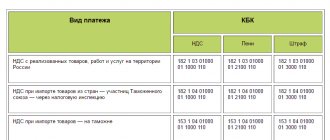Features of transport tax for legal entities
Transport tax for legal entities, as well as for individuals, is calculated using a simple formula:
Tax base × tax rate.
In addition, decreasing/increasing coefficients can also be added to this formula, and the tax rate in the region can be reduced or increased in relation to the basic values specified in paragraph 1 of Art. 361 Tax Code of the Russian Federation. But the tax rates established in the constituent entities of the federation cannot differ from the base ones by more than 10 times - such a limitation is specified in paragraph 2 of Art. 361 Tax Code of the Russian Federation.
Read more about the procedure for calculating transport tax for cars in our article “How to calculate transport tax for a car?” .
For expensive cars, the cost of which exceeds 3 million rubles, an increasing factor is applied. This coefficient can be found in paragraph 2 of Art. 362 of the Tax Code of the Russian Federation. Its value depends not only on the cost of the car, but also on the period of its use after release. Prices for luxury cars are updated annually and are available for viewing on the official website of the Ministry of Industry and Trade.
Taxpayers who are legal entities, unlike individuals, must calculate their taxes independently. Despite the fact that tax returns for 2020 have been canceled for organizations, and the Federal Tax Service must send them messages with the amount already calculated, legal entities must still calculate the tax themselves. First, they must know the amount in order to make advance payments throughout the year (if they are established in the region). And secondly, the message from the tax office is more of an informational nature, so that the company can compare its accruals with those made according to the tax authorities. After all, she will receive it after the deadline for paying advances (see, for example, letter of the Ministry of Finance dated June 19, 2019 No. 03-05-05-02/44672).
The message from the Federal Tax Service will indicate the object of taxation, tax base, tax period, rate and amount of calculated tax.
Important! Recommendation from ConsultantPlus Compare the amount of tax calculated by the inspectorate with the amount you calculated and paid yourself. If they are equal, then the tax was calculated and paid correctly. If the amounts differ, check:... What to check and what to do in case of an error (yours or the tax authorities), see K+. Trial access to the system can be obtained for free.
ATTENTION! If you do not receive the notification, you are required to independently inform the tax authorities about your taxable property. Read about the nuances in the material “Organizations will have to report transport and land plots to the tax authorities.”
VAT and tax on transactions with securities
Taxation of legal entities persons often includes a type such as VAT - this is one of the indirect payments. It is charged at all stages of production and sale of goods without exception. Today the VAT rate is 18%. It is applied by default if the transaction is not included in the legislative list of those that are taxed at 10% or are not subject to interest on added value at all.
Tax on transactions with securities is paid upon issue. The payers are the issuers of these securities, and the object is the nominal value of the issue, which was declared by the issuer himself.
In this case, payment to the budget is made along with the provision of all documents, registering the issue.
Become an author
Become an expert
Changes 2020–2021 on transport tax for legal entities
In recent years, the following changes have been made to the procedure for paying transport tax:
- Starting from 2021, the procedure and terms for paying advances on it will change.
- Starting from 2021, as we said above, tax declaration has been cancelled, and tax authorities must send companies a message about the tax amount. In this regard, companies have an obligation to inform inspectors about vehicles for which such a report has not been received. Failure to send messages will result in a fine. In addition, due to the cancellation of declarations, legal entities will need to submit applications for benefits to the tax authorities.
Previously:
- In 2021, the list of expensive cars was clarified. Cars are regrouped depending on year of manufacture and price.
- The differentiation of the increasing coefficient for passenger cars costing from 3 to 5 million rubles has been cancelled. As of August 3, 2018, changes to clause 2 of Article 362 of the Tax Code of the Russian Federation came into force, which established a coefficient of 1.1% for all cars in this price category. Let us recall earlier that the coefficient value depended on the year of manufacture of the car: less than 12 months ago, the coefficient was equal to 1.5%, from 1 to 2 years - 1.3%, from 2 to 3 years - 1.1%.
- The procedure for calculating the ownership coefficient in the reporting (tax) period has been clarified, according to which this coefficient upon receipt (disposal) of a vehicle in this period is determined as the ratio of the number of full months of ownership to the total number of months in the corresponding period. The full month is taken to be the month in which the vehicle was purchased before the 15th or was disposed of after the 15th (clause 3 of Article 362 of the Tax Code of the Russian Federation).
- Rules have been established that the list of expensive cars is applicable only to the period in which it was posted on the website of the Ministry of Industry and Trade before March 1 (clause 2 of Article 362 of the Tax Code of the Russian Federation), i.e., with a change in this list, the tax for previous years cannot be recalculated need to.
- Regional laws periodically adjust transport tax rates.
Read about what rates the regions apply in this article.
- Other changes.
Find out how organizations can check and pay transport tax from January 1, 2021 from the Ready-made solution from ConsultantPlus.
Personal income tax
In recent years, the Russian Federation has seen a constant flow of labor migrants ( population (lat. migratio - relocation) - the relocation of people from one region (state, country) to another, in some cases in large groups and over long distances
), the situation was complicated by the difficult situation in Ukraine, which resulted in the arrival of a huge number of refugees.
When employing foreigners, the company must take into account many aspects, especially in relation to taxation, and migrants must not forget that after receiving income they need to pay taxes (
a mandatory, individually gratuitous payment levied on organizations and individuals in the form of alienation belonging to them by right of ownership, economic management or operational ).
It is generally accepted that income tax is paid to the country where the person spent the majority of his time. When calculating the tax, it is not citizenship that is taken into account, but residence—the actual residence of a migrant in the Russian Federation for a certain time. As a general rule, a person is recognized as a resident if he lives in the Russian Federation for more than 183 days a year over a 12-month period. If a foreigner lives in the Russian Federation for less than this period, then he is considered a non-resident. What is meant here is not the calendar year, which begins in January, but specifically a period of 12 months; the countdown can begin from the middle of the first year, but will end in the middle of another. For example ( Example (rhetoric) - a concept in rhetoric, a special case used to explain the general
), if an employee arrived in the Russian Federation in July, then this period will end in June of the following year. The rate used, and therefore the amount of personal income tax—the personal income tax—depends on this status.
Personal income tax from salary
Personal income tax is one of the main sources of replenishment of the country’s budget; it is paid by all individuals who received income in the Russian Federation. There are many aspects to the taxation of foreigners that depend on their migration status and length of residence in the Russian Federation, as well as a number of reasons:
- The employee is a HQS or a refugee;
- The migrant arrived visa-free;
- The foreigner is a citizen of one of the states of the Eurasian Alliance.
The obligation to accrue, withhold from wages and transfer income tax ( money or material assets received by the state, individual or legal entity as a result of any activity for a certain period of time
) foreign people (personal income tax) into the budget is the responsibility of the employer, who in this case acts as a tax agent. One exception to this option is a foreigner with a patent. A certain amount of personal income tax is paid independently in the form of an advance payment, and the employer takes these amounts into account in the final calculation of personal income tax.
If the income is received by a migrant not as a result of fulfilling his own obligations enshrined in the employment contract, but, for example, after the implementation of a punishment, then the foreigner must declare this independently by submitting a 3-NDFL declaration to the tax authorities.
Personal income tax rates
The legislation of the Russian Federation establishes a fixed rate for personal income tax:
- 30% - for non-residents;
- 13% - from VKS income;
- 13% - from income acquired by participants in the State Resettlement Program;
- 13% - for resident foreigners.
Of course, the rate depends on the length of residence of the foreigner ( A foreigner is a person who is located on the territory of a state of which he is not a citizen or subject
) in the Russian Federation, that is, whether he is a resident or not. Non-residents pay personal income tax at a 30 percent rate if their period of residence in the Russian Federation is less than 183 days. But there are a number of foreigners who, not being tax residents, pay personal income tax at special rates:
- Highly qualified specialists (HQS);
- Foreigners with patents;
- Refugees;
- Citizens of the Eurasian Alliance.
Highly qualified specialists
A foreigner receives the status of a high-qualified specialist if he fulfills the first main condition - his salary is above 2 million per year (or 1 million per year for scientific and teaching employees). Hiring HQS imposes additional responsibilities on the company. For example, the employer must confirm every month that the wages of valuable personnel have remained at the required level.
For the Aerospace Forces, headquarters ( the location of the commander of the troops, his headquarters, in a broader sense - the supreme military command, including: Headquarters of the Supreme Commander-in-Chief - the body of the highest field command and control of troops
) for personal income tax is 13%, regardless of whether they have achieved tax resident status.
But this applies only to the wages of a highly qualified specialist, which is remuneration for the performance of his labor functions. If we are talking about a number of other payments, for example, compensation for renting a home, cellular communications, additional payment for food, one-time bonuses, then the rate will be 30% until VSK achieves resident status.
Refugees
Refugee status is assigned by the FMS (renamed to the Main Directorate for Migration Affairs of the Ministry of Internal Affairs) after the foreigner or stateless person provides the necessary documentation. The main condition for obtaining such status is personal persecution in the homeland, a threat to life and health. Status ( an abstract polysemantic word (a term in some areas of life), in a general sense denoting a set of stable values of the parameters of an object or subject
) is assigned for 3 years, if after this time the threat to a person does not disappear, then the period is extended.
Refugees have a number of privileges compared to other foreigners (for example, those who have received temporary asylum or temporary residence permit): they have virtually equal rights with Russians, can receive benefits and pensions, have social benefits, and take advantage of free medicine. The personal income tax rate for such persons is 13% . But as soon as a person loses his own status, personal income tax is calculated on a general basis.
Citizens of the EAEU states
Citizens of Armenia, Kazakhstan and Belarus have the same rate as Russians - 13% . This is established by international agreements.
Deadline for payment of transport tax for legal entities
From 2021, the deadline for payment of transport tax by legal entities is clearly stated in the Tax Code of the Russian Federation. This is March 1 of the year following the expired tax period. The deadline for paying advance payments (from advances for 2021) is no later than the last day of the month following the expired reporting period (clause 1 of Article 363 of the Tax Code of the Russian Federation).
Previously, there was no indication of specific payment dates in the code. And the answer to this question had to be sought in regional legislation: regional authorities were given the right to independently determine the payment deadline for transport tax and advances. However, the deadline for paying tax at the end of the year could not be set earlier than February 1 of the year following the reporting year (clause 1 of Article 362 of the Tax Code of the Russian Federation).
The amount of the quarterly advance payment is ¼ of the tax calculated for the year (clause 2.1 of Article 362 of the Tax Code of the Russian Federation). The amount of transport tax payable at the end of the current tax period is determined as the difference between the amount indicated in the tax return and the total value of previously paid advances (paragraph 2, paragraph 2, article 362 of the Tax Code of the Russian Federation).
Establishing payment of advance payments for regions, as before, is not mandatory (clause 3 of Article 360 of the Tax Code of the Russian Federation). If advances are not established, then legal entities must pay the entire tax amount at once in the full amount accrued for the year, within the period established by regional law.
The procedure for preparing a payment invoice for payment of transport tax, including a sample of how to fill it out, is given in the Ready-made solution from ConsultantPlus.
Change #1
Accountants will no longer have to submit advance calculations for corporate property taxes in 2021. From January 1, 2021, this reporting was canceled.
You will only need to submit an annual return to the tax office. The Federal Tax Service is already developing a new form. Lines for advance payments will appear in it. You will transfer them to the budget according to the old rules.
But don’t relax – the 2020 property tax return has been updated. Organizations that report property taxes after January 1 must prepare declarations using the new form. The Federal Tax Service approved a new form, the procedure for filling it out and the electronic format (order dated August 14, 2019 No. SA-7-21/405). Submit a new declaration for reporting for 2021.
The property tax return form has been changed slightly. The barcodes at the top of the title page and other sections have been changed. In section 1, new lines were added for calculated tax payable and advance payments for the first quarter, half a year and 9 months (lines 021-027). In sections 2 and 3, where the annual tax on real estate with the average annual and cadastral value is calculated, advance payments no longer need to be reflected.
In section 2.1, new codes for ships and aircraft were added.
Results
Legal entities - owners of vehicles registered with the registration authorities must pay transport tax. It is not paid only in relation to transport, which is mentioned in paragraph 2 of Art. 358 Tax Code of the Russian Federation. Taxpayers who are legal entities must calculate the tax amount independently, but they no longer need to submit a tax return.
Organizations must pay transport tax in advance, unless another method of paying the tax is specified in regional legislation. The deadlines for paying advances and taxes are new from 2021.
Sources:
- Tax Code of the Russian Federation
- Order of the Federal Tax Service dated November 26, 2018 No. ММВ-7-21/ [email protected]
You can find more complete information on the topic in ConsultantPlus. Free trial access to the system for 2 days.
General information
According to the legislation of the Russian Federation, each owner must pay income tax when selling real estate. This also applies to transactions with land plots. There are certain payment terms and requirements for payers. Tax on the sale of a plot of land is paid by individuals and legal entities, as well as individual entrepreneurs.
The amount of personal income tax depends on the status of the payer. If we are talking about a resident of the Russian Federation, then he needs to transfer 13% of the income. Non-residents of the Russian Federation, that is, foreign citizens, must pay 30%. For individual entrepreneurs and organizations, personal income tax is calculated based on the taxation system they use.
What are the reasons for paying tax for a legal entity in cash?
Indeed, if we talk about a legal entity, like any other business entity, then it generally makes most of its payments using a current account. However, the need for a company to pay tax in cash may arise if:
- The company's current account was blocked for one reason or another. For example, when a bank’s license is revoked.
- The company did not manage to open a current account by the time the deadline for paying a mandatory tax that does not depend on the fact of receipt of revenue (for example, transport or UTII) came due.
- Employees of the company responsible for paying taxes - for example, the chief accountant or employees subordinate to him - have lost access to their current account while taxes urgently need to be paid. As an option, if the digital signature is compromised and its temporary deactivation, after which it becomes impossible to use the bank account. The company may also have technical problems - for example, interruptions in the Internet.
This, of course, is not an exhaustive list of possible reasons why a legal entity’s current account may be unavailable, but these reasons can rightfully be considered among the most common.
By the way, another option is possible in which the tax will actually be paid in cash - this is the procedure for its forced collection using a writ of execution by the Bailiff Service. In this case, the interested structures, in principle, do not care how the tax debt is repaid - the legislation provides for regulations for its payment, in fact, with any assets of the company - cash, movable or immovable property, accounts receivable.
But paying off debts through enforcement proceedings is a procedure that is carried out in accordance with special legal norms, with which the company generally does not deal. Therefore, we will focus on a typical scenario in which taxes are nevertheless paid voluntarily.
So, paying taxes for a legal entity in cash is possible, and anyone can do it. Another thing is that this procedure must be carried out correctly. Let's consider what conditions for this to be met by the payer.






